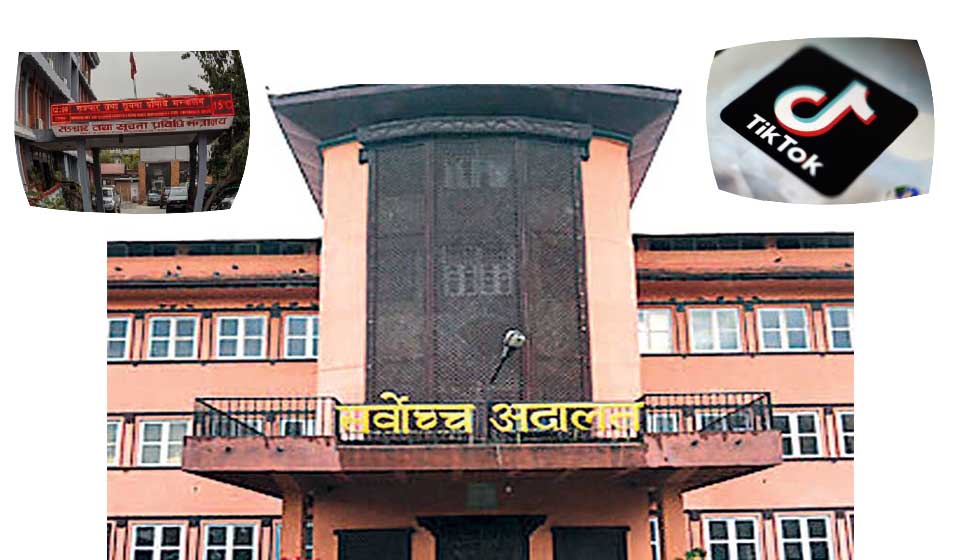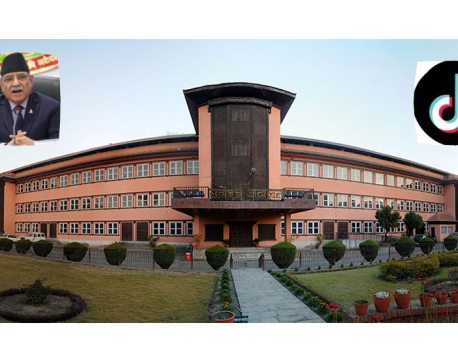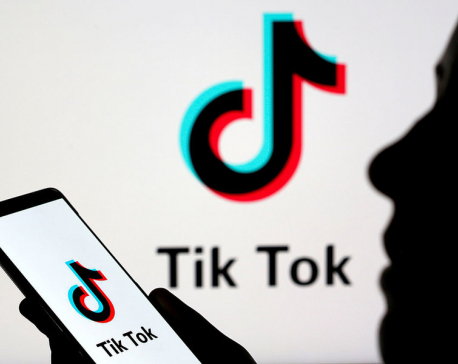
OR
Communication ministry submits written clarification to SC over TikTok ban
Published On: December 4, 2023 05:54 PM NPT By: Republica | @RepublicaNepal

The ministry says the decision to ban TikTok was taken after it became impossible to regulate activities on the social media platform
KATHMANDU, Dec 4: The Ministry of Communication and Information Technology (MoCIT) has submitted a written clarification to the Supreme Court (SC) over the ban imposed on TikTok, stating that the decision to ban the social media platform TikTok was made because it was not possible to regulate the activities on TikTok.
The MoCIT submitted the written explanation to the apex court on December 4, claiming that Tiktok's self-regulation is inadequate and that real-time content cannot be removed, so it had to be banned.
In a written clarification sent to the SC by the Secretary of the Ministry of Communications, Krishna Bahadur Raut, it is said, “Unlike other social networks that remove content violating community guidelines, TikTok lacks the capability to remove real-time content. Moreover, TikTok records live videos and shares them on other social networks, making regulation currently unattainable.”
In 2018, various social media operating companies endorsed the Santa Clara Principles. According to the revised principle in 2022, social media operating companies must ensure the human rights of users.
The MoCIT argues that TikTok's failure to adhere to the principles, particularly in promptly removing false and misleading content, justifies the need for the ban.
The MoCIT claims that Tiktok has set an algorithm so that users can get videos according to their interests, so users will become addicted to watching the videos for hours and it will adversely affect human health.
In a written response, the ministry said, “Excessive use of Tik Tok is causing problems such as insomnia, anxiety, and depression, as well as leading children and youth to the wrong direction and creating a toxic psychology.”
The MoCIT alleges that TikTok displays obscenity, promotes immoral activities, conducts explicit live broadcasts, and contributes to an increase in illegal activities. The ministry said, “There was an increase in unethical, unlimited and anti-social activities to receive gifts through live streaming on Tik Tok.”
The MoCIT claims that Tik Tok poses risks to citizens' personal and confidential data, challenges national sovereignty, and violates privacy, describing it as a threat to national sovereignty.
The ministry argues that while in some countries, social media empowers citizens and holds the government accountable, Nepal faces a different scenario. Consequently, the MoCIT claims it is compelled to regulate the uncontrolled use of social media.
The ministry maintains that TikTok has led to obscenity, human trafficking, misinformation, rumors, threats to national security, and adverse effects on the mental health of the youth.
According to the ministry's claim, most of the recent complaints to the police and cybercrime cases filed in courts were related to the content of Tik Tok.
Mentioning the fact that 28 countries including Nepal have banned Tik Tok, the ministry has said, “It has decided to ban Tik Tok on November 13, 2023 with the conclusion that Tik Tok has had a negative impact on social harmony and the environment.”
Earlier, Prime Minister Pushpa Kamal Dahal also submitted a written clarification to the SC regarding the banning of Tik Tok and claimed that Tik Tok has spread social diseases and epidemics.
There were 16 writ petitions registered at the SC against the government’s decision to ban Tik Tok. Although the bench of Justice Binod Sharma refused to issue an interim order, it gave priority to the case and ordered the government to submit a written clarification on the hearing held on Tuesday.
There will be a regular hearing on this case in the SC from tomorrow, December 5.
You May Like This

PM Dahal submits written clarification to SC, citing social concerns for TikTok ban
KATHMANDU, Dec 1: Prime Minister Pushpa Kamal Dahal has submitted a written clarification to the Supreme Court (SC) on TikTok... Read More...

SC defers hearing on petition against Tik Tok ban
KATHMANDU, Dec 5: The hearing on the writ petition against the government's decision to ban the social media platform Tik... Read More...

Another writ petition filed in SC against Tiktok ban
KATHMANDU, Nov 20: An additional writ petition has been filed at the Supreme Court (SC) on Monday against the government's... Read More...







Just In
- NRB to provide collateral-free loans to foreign employment seekers
- NEB to publish Grade 12 results next week
- Body handover begins; Relatives remain dissatisfied with insurance, compensation amount
- NC defers its plan to join Koshi govt
- NRB to review microfinance loan interest rate
- 134 dead in floods and landslides since onset of monsoon this year
- Mahakali Irrigation Project sees only 22 percent physical progress in 18 years
- Singapore now holds world's most powerful passport; Nepal stays at 98th











Leave A Comment